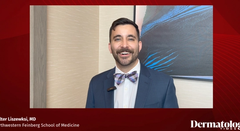
Tailoring Treatment for Atopic Dermatitis Beyond Steroids
Walter Liszewski, MD, discusses the personalized and evolving treatment landscape for moderate to severe AD, emphasizing a tailored approach using new biologics and non-steroidal topicals to meet individual patient needs and expectations.
Episodes in this series

Walter Liszewski, MD, a dermatologist at Northwestern University specializing in atopic dermatitis, chronic urticaria, and patch testing, shares insights on treating moderate to severe atopic dermatitis (AD). With a clinical focus on patients suffering from chronic itch and rash, Liszewski discussed the evolving treatment landscape and the nuanced approach required for individualized care.
One of the primary challenges in managing moderate AD is navigating patient expectations. Since many patients have lived with the disease since childhood, gauging what constitutes "well-controlled" disease varies significantly. Some are eager for aggressive therapy, while others prefer conservative approaches. Fortunately, as of 2025, a growing array of biologics and topicals provides the flexibility to tailor treatment to patient preferences and disease severity. For patients with severe AD, the availability of multiple systemic agents with diverse mechanisms of action allows clinicians to aim for complete clearance, even in those who have failed prior biologics.
When selecting topical treatments, Liszewski emphasized the foundational role of corticosteroids but also acknowledges their long-term limitations, including skin thinning and discoloration. He advocates for newer non-steroidal options like roflumilast (Zoryve; Arcutis Biotherapeutics), ruxolitinib (Opzelura; Incyte), and tapinarof (Vtama; Organon), which offer effective alternatives without steroid-associated risks. With his expertise in patch testing, Liszewski highlighted propylene glycol sensitivity as an underrecognized issue in AD management and favors Zoryve in patients with this concern. He also prefers Opzelura for delicate areas such as the face and neck due to its potency and tolerability.
Liszewski also noted the recent approval of delgocitinib for chronic hand eczema, signaling an exciting expansion in high-potency, non-steroidal options that could further revolutionize long-term care for patients with atopic dermatitis.
Newsletter
Like what you’re reading? Subscribe to Dermatology Times for weekly updates on therapies, innovations, and real-world practice tips.















